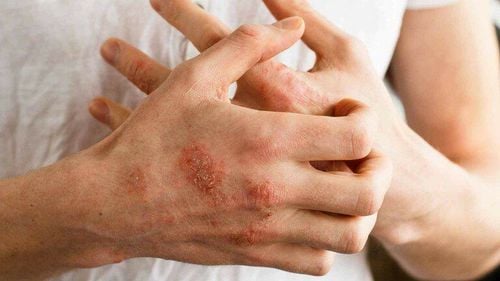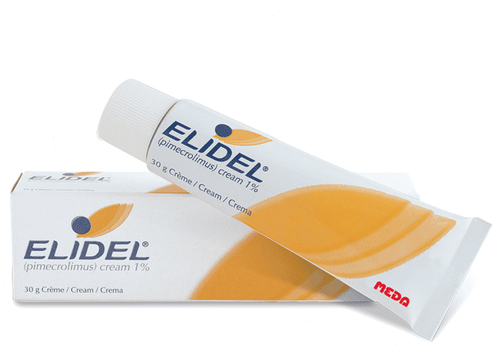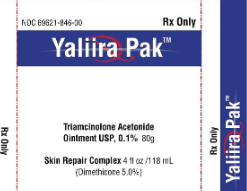This is an automatically translated article.
Abrocitinib is an inhibitor of Janus kinase activity. Used in some cases of atopic dermatitis that is severe and unresponsive to other measures. The drug can bring many risks when used, so before using it, it should be carefully considered.1. What is abrocitinib?
Abrocitinib is a Janus kinase (JAK) inhibitor that works on the immune system. Abrocitinib is used to treat moderate to severe atopic dermatitis in patients who have been taking other medicines correctly but have not been effective and their condition is not well controlled.
In several studies, the use of this drug has been shown to be strongly effective in clearing the skin, improving symptoms of itching and reducing the severity of atopic dermatitis. Therefore, the drug is indicated in the following cases:
Have moderate to severe atopic dermatitis (atopic dermatitis) that cannot be controlled by other treatments. Moderate to severe atopic dermatitis. But cannot tolerate the available treatment drugs. Note when using the drug for the following cases:
Do not use for people with a history of allergy to any ingredient of the drug. Do not use for people with systemic infections, severe infections. Decreased blood cell count. Such as anemia, thrombocytopenia, leukopenia. Severe liver and kidney disease do not use. Use this medicine with caution in the following conditions:
Hyperlipidemia, mild infections History of neutropenia, thrombocytopenia (low platelet count), anemia . Have diabetes, heart or blood vessel disease, history of hepatitis B, C. Herpes zoster virus infection, HIV infection. Chronic lung disease. Skin cancer, history of tuberculosis or active tuberculosis. Weakened immune system. Kidney disease, mild or moderate. Smokers, current or past These conditions can increase your risk of serious side effects.
2. Usage and dosage of Abrocitinib
How to use Abrocitinib correctly: It is important to use it only as directed by your doctor. Do not self-medicate more, more often, and do not use the medicine for a longer time than prescribed by your doctor. The drug is in the form of a pill, so you can take it orally. Abrocitinib should be taken at the same time each day, with or without food. When taking orally, swallow the tablet whole with water, do not crush, split or chew the medicine.
Dosage: The dose of Abrocitinib will be different for each individual patient. Depends on the severity and response of each patient.
For atopic dermatitis:
Adults take 100mg once daily. Children: Use and dosage must be determined by a physician. Missed dose: If you miss a dose, take it as soon as possible, then go back to your normal dosing schedule. If you miss a dose and it is less than 12 hours before your next dose, skip the missed dose and take your next dose at the usual time.
Storage of medicines: Should be stored in sealed packaging at room temperature, away from high temperature, moisture and direct light. Do not store in freezer, need to keep out of reach of children. Do not keep medicine that has expired or is no longer needed.
3. Possible side effects when taking Abrocitinib
Along with the therapeutic effects, when taking the drug can cause some unwanted effects. While not all of these side effects are possible, if they do, medication may need to be reviewed and treatment as needed.
Common side effects: stuffy nose, lower abdominal pain, difficulty urinating, burning or frequent urination, lower back pain or pain on one side, appearance of pimples. Less common side effects: Bleeding gums, bleeding in urine or stools, burning or stinging sensation in the skin, chills, cough, diarrhea, fever, malaise, joint pain, muscle pain, headache, loss of appetite, nausea, blisters on the body, cold sores on the lips, nose, eyes or genitals. Skin bleeding, sore throat, abdominal pain, trouble sleeping, rhinitis... Rare side effects: Blisters, burning, scaly skin, dry or peeling skin, blurred vision, dizziness, itching , severe skin redness, soreness or swelling of the skin, anxiety, ringing in the ears, red rash and blisters filled with water, yellow or pus, slow or fast heartbeat. Frequency not known: Chest pain or tightness, persistent sores that won't heal, red patches on the skin, seeing flashes of light or sparks, or seeing raised spots in front of the eyes or as a sheet a veil or a veil that appears over part of your vision... Some side effects can occur that usually do not require medical attention. These side effects may go away during treatment as your body adapts to the medicine. In addition, your doctor can tell you about ways to prevent side effects.
However, there are some serious side effects that can occur and require medical treatment. If you notice serious and persistent side effects, you should notify your doctor right away.
Before any decision to take medication, always consult with your doctor so that you can carefully weigh the benefits and risks of taking the drug. Abrocitinide carries the risk of serious side effects, especially in high-risk individuals.
Please dial HOTLINE for more information or register for an appointment HERE. Download MyVinmec app to make appointments faster and to manage your bookings easily.
Reference source: drugs.com












